Polymers play a crucial role in wastewater treatment, improving the efficiency of various treatment processes and contributing to cleaner, safer water. They are widely used in coagulation, flocculation, and sludge dewatering to remove suspended solids, organic matter, and contaminants from wastewater. Here’s a detailed look at the importance of polymers in wastewater treatment:
1. Enhanced Coagulation and Flocculation
- How They Work: Polymers, often referred to as coagulants and flocculants, help in the agglomeration of suspended particles, colloids, and dissolved solids in wastewater. By neutralizing the charges on particles, polymers encourage smaller particles to come together and form larger clumps or flocs, which can then be easily removed through sedimentation or filtration.
- Advantages:
- Speeds up the removal of fine particles.
- Improves the efficiency of the overall treatment process.
- Reduces the need for inorganic coagulants like alum or ferric chloride.
2. Improved Sedimentation
- Importance: Polymers help in improving sedimentation by forming larger and denser flocs, which settle faster than smaller particles. This reduces the retention time required in clarifiers or settling tanks, leading to more efficient operations.
- Advantages:
- Increases the rate of sedimentation.
- Reduces the space and time required for settling.
- Enhances the clarity of the treated water by removing suspended solids.
3. Sludge Dewatering
- How Polymers Help: In sludge treatment, polymers are used to thicken and dewater sludge, the residual by-product of wastewater treatment. The addition of polymers causes water to separate from the solids, forming a drier, more manageable sludge.
- Advantages:
- Reduces the volume of sludge to be disposed of.
- Lowers transportation and disposal costs.
- Enhances the efficiency of mechanical dewatering equipment such as centrifuges, belt presses, and filter presses.
4. Reduction in Chemical Consumption
- Polymer Efficiency: Polymers can be more efficient than traditional coagulants like aluminum sulfate or iron salts. Because they are highly effective at lower dosages, they reduce the overall amount of chemicals required for water treatment.
- Advantages:
- Lowers the operational costs.
- Minimizes the need for post-treatment processes to neutralize the effects of excess chemicals.
- Reduces the amount of chemical sludge generated during treatment.
5. Removal of Organic and Inorganic Contaminants
- Targeting a Wide Range of Contaminants: Polymers are effective in removing both organic (such as oils, fats, and greases) and inorganic (such as heavy metals and phosphates) contaminants from wastewater.
- Advantages:
- Enhances the removal of pollutants that are difficult to settle or filter.
- Improves the quality of the treated water, making it suitable for reuse or safe discharge into the environment.
6. Improved Filtration Efficiency
- How Polymers Help: In filtration processes, polymers improve the removal of suspended solids and colloidal particles. By aggregating fine particles into larger flocs, polymers prevent clogging of filters and improve the throughput of filtration systems.
- Advantages:
- Extends the lifespan of filters.
- Reduces maintenance and operational downtime.
- Enhances water clarity and quality.
7. Reduced Environmental Impact
- Sustainability: Polymers are available in a variety of forms, including biodegradable and environmentally friendly options, which reduce the environmental footprint of wastewater treatment.
- Advantages:
- Lowers the toxicity of the chemicals used in water treatment.
- Reduces the production of chemical by-products that could harm ecosystems.
8. Cost-Effectiveness
- Economic Benefits: The use of polymers in wastewater treatment leads to overall cost savings. Because they work more effectively at lower concentrations, polymers reduce chemical costs, sludge handling, and disposal expenses.
- Advantages:
- Reduces operational and maintenance costs in treatment plants.
- Enhances the efficiency of existing treatment infrastructure, avoiding expensive upgrades.
- Saves energy in processes such as sludge dewatering and sedimentation.
9. Customization for Specific Applications
- Tailored Solutions: Polymers are available in different forms (anionic, cationic, nonionic) and molecular weights, which can be tailored to the specific characteristics of the wastewater being treated. This flexibility allows treatment plants to optimize their processes based on the type of contaminants present.
- Advantages:
- Provides solutions for treating complex and variable wastewater streams.
- Allows for fine-tuning of treatment processes for better efficiency and cost-effectiveness.
10. Prevention of Scaling and Fouling
- How Polymers Help: Some polymers are used as antiscalants, preventing the formation of scale on pipes, membranes, and equipment in water treatment systems. This helps maintain the efficiency of the system and reduces the need for frequent cleaning and maintenance.
- Advantages:
- Prolongs the lifespan of treatment equipment.
- Reduces maintenance downtime and associated costs.
- Improves water flow and reduces energy consumption.
Conclusion
Polymers are indispensable in wastewater treatment due to their efficiency in coagulation, flocculation, sludge dewatering, and pollutant removal. Their versatility, cost-effectiveness, and ability to reduce chemical usage make them essential for modern water treatment processes, contributing to cleaner water, more sustainable operations, and lower environmental impact.



Recent Comments